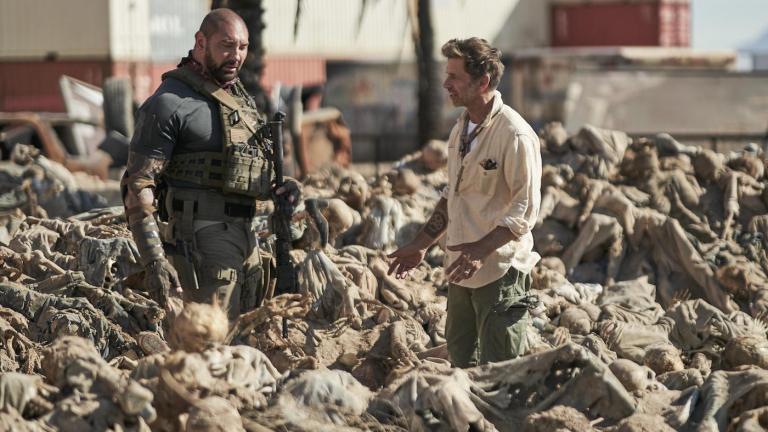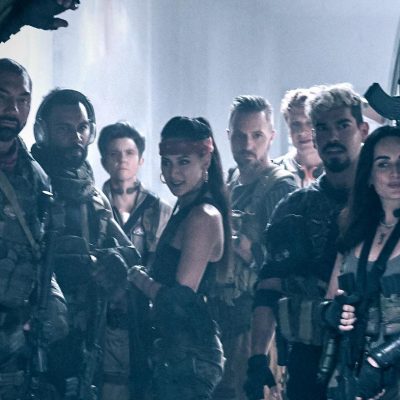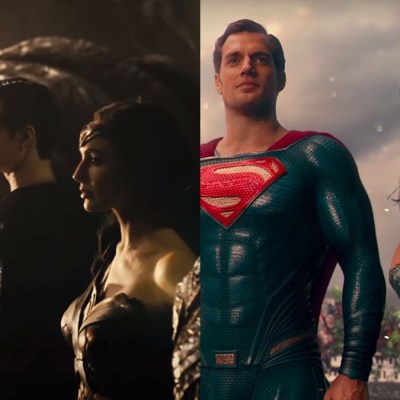Army of the Dead: How Zack Snyder Is Revolutionizing Zombie Movies
Zack Snyder talks about “digging my teeth” into zombie movie politics with Army of the Dead, the first zombie movie with alphas and refugee camps.

Since long before Zack Snyder or Army of the Dead, zombie movies have proven to be one of the most surprisingly versatile subgenres in film. George A. Romero pioneered the form with the incisive, socially conscious Night of the Living Dead and Dawn of the Dead, and since then we’ve seen an ever-growing menagerie of zombies and zombie movies. More than a few times, the undead ghouls have been reinvented to frighten and fascinate audiences across the world.
So it’s probably fair to wonder at this point whether we’ve just about seen it all when it comes to zombie flicks. Innovative takes on the genre like Shaun of the Dead, Train to Busan, and Warm Bodies have taken the zombie myth and twisted it in unexpected ways. And Zack Snyder’s own remake of Romero’s Dawn of the Dead was an amplified homage to the original with a wry sense of humor. It received praise from fans of the genre, and to this day is considered to be one of the best efforts in Snyder’s oeuvre.
Now, 16 years later and after an eight-year stretch of superhero movies for Warner Bros., Snyder is returning to his zombie roots by partnering with Netflix for Army of the Dead, a heist/zombie movie mash-up that he hopes will take the genre to new heights in several ways.
The story is set in a zombie apocalypse that originated in Area 51. Six years after the outbreak, Las Vegas is essentially quarantined, with a wall built around it to contain the zombie hordes that have taken over the city. The government plans to nuke Vegas to end the zombie outbreak for good. In this time of chaos, a former casino boss, Bly Tanaka (Hiroyuki Sanada), hires a group of mercenaries led by zombie war hero Scott Ward (Dave Bautista) to infiltrate the city and extract $200 million that’s sitting in his vault underneath the strip before the city is pancaked by the government. The team should have plenty of time to get in and out before the bomb drops, but once they’re inside, they learn that the president has moved up the drop date to appease his supporters, giving the team little time to get out of the drop zone before the city is blown sky high.
Worse, while on their way to the vault the team will have to fight off a massive army of undead led by Zeus, a highly intelligent and combat-savvy “alpha” zombie who started the outbreak at Area 51. When Zeus bites someone, they become a deadly alpha like him; when an alpha other than Zeus bites someone, they become a more traditional “shambler” zombie.
Netflix invited Den of Geek to the set of Army of the Dead back in 2019 where we had the chance to sit with Snyder and the cast to get a behind-the-scenes look at the making of the movie.
“From the first conceptualization of the movie, [we knew] there were going to be these evolved zombies,” Snyder explains as he sits with members of the press on his lunch break. “I thought it would be cool if there was a way to have a little bit of sympathy for the bad guy. It’s hard to have sympathy for a normal zombie. In a way, the guys who kill them seem like they’re doing them a favor. I thought if we were able to create this other class of zombie that was semi-conscious, treating them like a wolf or dog, like, they can’t talk, but they can organize.”
This highly evolved class of zombie gave Snyder and co-writer Shay Hatten more creative opportunities when laying out the story, lending emotional depth to the traditionally one-sided human-zombie conflict. The government feels that they’ve imprisoned the zombies in Vegas, but perhaps the alphas and their shambler offspring would rather just be left alone.
Alphas aren’t the only new form of zombie that you’ll see in the movie. Las Vegas is home to all manner of bizarre creatures, both animal and human, and you can expect to see a wide variety of gruesome undead versions of Vegas oddities and eccentrics as the mercs battle their way to the center of the strip. Zombie Elvis impersonators, zombie male dancers, zombie tigers, zombie brides… it’s all very Vegas, and reflective of just how much fun Snyder had making the movie.
“Zeus rides a horse!” Snyder gushes. “He’s the smartest of all of them. Whether he has hopes and dreams, I’m not sure. But our humans give zero fucks about his world. It’s kind of a fun relationship between him and the team.”
As for the team’s interactions with each other, Snyder assured us that while the movie is as fun and bombastic as you would expect, the character work is the spine of the film and informs all of the action.
Bautista’s Scott begrudgingly lets his estranged, activist daughter Kate (Ella Purcell) join his crew in the film, and they’re forced to work out their issues as they carry out the mission. Joining them are Scott’s friend and adept mechanic Cruz (Ana de la Reguera), helicopter pilot Marianne (Tig Notaro), expert zombie-killer Vanderohe (Omari Hardwick), reckless social media influencer Guzman (Raúl Castillo), the casino’s head of security Martin (Garret Dillahunt), and Scott’s “ride-or-die” compatriot, Chambers (Samantha Win). The film also stars Nora Arnezeder, Theo Rossi, Huma S. Qureshi, and Matthias Schweighöfer
“At its heart, it’s a relationship movie,” Snyder says. “[Scott] and his daughter are trying to mend their relationship over the course of the movie. She shouldn’t have been on the mission but she kind of tricks him. It’s this small relationship movie inside of it all about a father who kind of abandons his child and tries to make it right. On top of that, it’s pure genre insanity.”
From what we were shown on set that day, the movie certainly looks to deliver on the genre goodness, for both the zombie and heist fronts. Snyder and company had rented out the entire casino floor at the Showboat hotel in Atlantic City, and they spent several days filming frantic zombie-killing action scenes involving a ton of wire work and big, loud guns (which Snyder test-fired himself with childlike giddiness). There were dozens of zombie extras running around, and the casino floor was so littered with inanimate zombie bodies that we had to watch our step virtually everywhere we went. Rest assured, the movie will be action-packed.
Another way Snyder and his team are attempting to make Army of the Dead a progressive entry in the genre is with its deliberately diverse cast.
“Something that was really important to us was to have a global cast,” says producer Deborah Snyder. “Being on Netflix, the majority of the audience is international. There’s no reason the cast should be all American, all white. And it was really important for us, and me especially, that the women are as strong as their male counterparts. That’s something that I’ve been striving for, especially in action and genre. Their characters have depth.”
The cast being led by Bautista makes sense in that he’s a big star, but what perhaps goes under the radar in many people’s eyes is that he’s essentially the first Filipino-American to lead a diverse cast in the history of major motion pictures.
“Dave has been amazing. He’s awesome,” Zack says of his leading man. “My movies are pretty popular in the Philippines anyways, so I’m excited about this added bit that’s really going to take it to the stratosphere, I hope. He considers himself this anti-action hero but he can do any of the action! It’s cool. He’s not afraid to be rough and not look good all the time. That’s what’s cool. And he can be vulnerable.”
When sitting down with Bautista on set, the actor describes a deep sense of duty and fulfillment in representing Filipinos on the big screen.
“I’m getting ready to have the Filipino stars tattooed on my chest, front and center, really big!” Bautista shares. “It speaks to where my pride is as far as being a Filipino. I’m half-Filipino, but I embrace it completely. I’ve never been embraced like I was when I went to the Philippines. It means a lot to me. I want to represent something and I want to inspire people. It means everything to me.”
In addition to the film’s cast representing a wide range of communities, Snyder harnesses the strength of zombie movies as socio-political commentary by weaving statements about the current state of the United States into the fabric of the narrative.
“There’s zombie-infested Vegas, and then what happened was they built this refugee camp at the outset of the zombie plague to quarantine,” Zack explains. “Six year later, the camp still exists, so now it’s this political tool that the government uses. If you have contradictory political views, they’ll stick you in there. They have a heat gun, and if you’re below 98.6 degrees, that’s probable cause to put you in.”
The director continues, “A lot of the people in the refugee camp are disenfranchised. Whether it’s a statement about immigration or the literal refugee camps around the world, it made sense to me to have an internationally diverse cast because of the centerpiece of the movie. This group that goes in are a mish-mash… they’re mutts. They’re rogue samurai.”
For Snyder, the feel of Army of the Dead was inspired by some of the most classic genre movies from his youth, though as in his previous work, he attempts to build on the concepts they introduced by subverting expectations and putting his own unexpected twists on genre conventions.
“When we did Dawn of the Dead, it was a slightly genre-buster movie in that I was a fan of the original, and I didn’t want to remake the movie, exactly,” Zack says. “I was trying my best to pay homage to the movie but I was always only referencing the original as opposed to a straight remake. I find that to be a fun area to be in.”
He continues, “Army of the Dead was really inspired by Escape From New York, [James] Cameron’s Aliens, Robocop… that world. It’s very much a genre deconstruction in the sense that I love all the genre tropes, and so I’m constantly trying to subvert the tropes by having them not finish as they typically would.”
After spending eight years in the superhero movie making business, Snyder felt that going back to intimate, genre storytelling would be exactly what he needed to reinvigorate his creative mind and passion. He needed a change of pace, and he missed being hands-on with the filmmaking process.
“Your relationship to the photographic process, even the actors… you grow further and further away from it,” he says of making big superhero movies. “I was still drawing the shots, but they were getting made further away. That’s kind of true of all aspects of the movie. This movie, for me, is a 100 percent organic experience where I take hold of it as a filmmaking process, as a writing process, photographically, as a director. It’s a joy to get up and work on. There are no real politics. Just make the movie as cool as you can, that’s it. In that way, it’s super refreshing and inspiring.
Snyder’s proximity to the tactile, hard work of filmmaking was evident from my time on set. In addition to directing, he acted as the movie’s DP and B camera operator and was interacting with the actors constantly, all while quite visibly having a lot of fun. It’s difficult to imagine he was as playful and loose on the sets of his DC movies. According to Snyder, while Army of the Dead certainly took a lot of hard work to make, he was constantly inspired by the material and embraced the challenge.
“Every movie is a struggle, right?” says Snyder. “I love that about moviemaking. The smoothest movie in the world is a shitfight. But with this movie I could make a subversive movie but no one would have to reach for the symbolism. It’s right there. It’s a genre that is about that, right? A good zombie movie, all the great Romero movies, they’re all mirrors. The zombies are us. For me, that was a great place to dig my teeth in.”
And working on a smaller scope means that this is the most personal movie Snyder has made in quite some time.
“It’s a giant movie, but I’ve tried to get at it in a super intimate, personal way,” he says. “This is not a movie that’s made by committee. It’s personal, singular, my eye seeing the movie.”
Army of the Dead hits select theaters on May 14 and Netflix on May 21.


